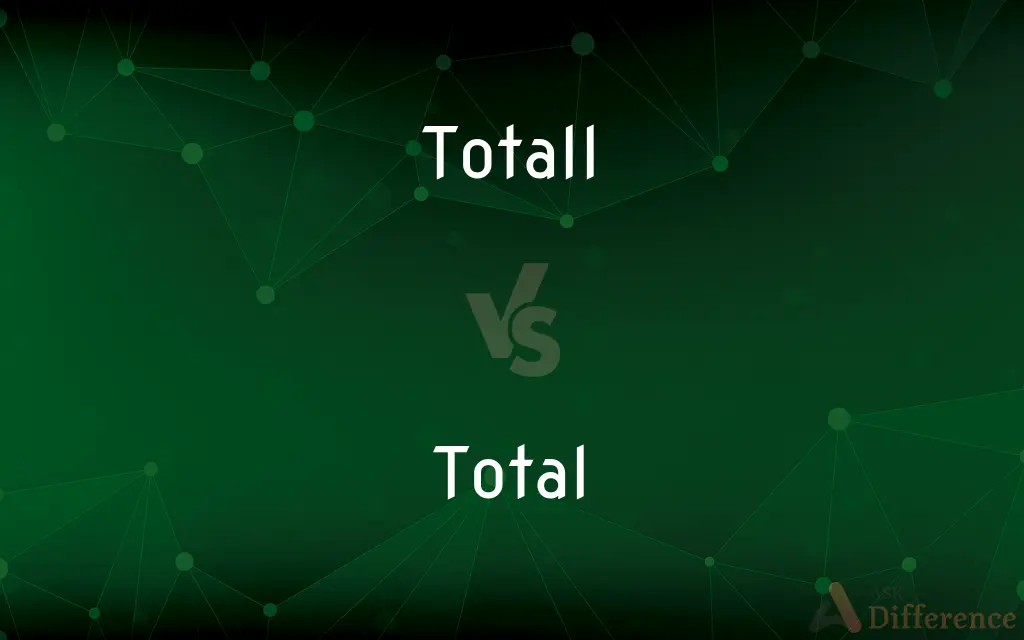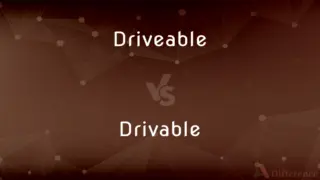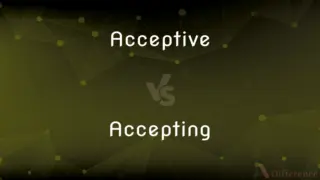Totall vs. Total — Which is Correct Spelling?
Edited by Fiza Rafique — By Munazza Shafiq — Updated on April 22, 2024
Totall is the incorrect spelling of total. Total refers to the entire amount or number of something.

Table of Contents
Which is correct: Totall or Total
How to spell Total?

Totall
Incorrect Spelling

Total
Correct Spelling
ADVERTISEMENT
Key Differences
Total is spelled with one "l" at the end, aligning with similar words like "metal" and "petal."
The spelling "total" is consistent with the pronunciation, /ˈtoʊ.təl/, which does not suggest a doubled consonant.
Remember, "total" derives from the Latin "totus," meaning "whole" or "entire," which does not double the last letter.
Think of "total" as complete or full - nothing needs to be added, not even an extra "l."
How Do You Spell Total Correctly?
Incorrect: The totall damage from the storm was extensive.
Correct: The total damage from the storm was extensive.
ADVERTISEMENT
Incorrect: The cost was estimated at totall $200.
Correct: The cost was estimated at total $200.
Incorrect: Her efforts made a significant impact on the project's totall success.
Correct: Her efforts made a significant impact on the project's total success.
Incorrect: We need to do a totall evaluation of the system.
Correct: We need to do a total evaluation of the system.
Incorrect: They reached a totall of 100 points in the game.
Correct: They reached a total of 100 points in the game.
Total Definitions
The entire thing considered as a whole.
The total effect of the play was stunning.
Comprising the whole number or amount
A total cost of £4,000
Complete; absolute
A total stranger
It is a matter of total indifference to me
The whole number or amount of something
In total, 200 people were interviewed
He scored a total of thirty-three points
Amount in number to
They were left with debts totalling £6,260
Damage (something, typically a vehicle) beyond repair; wreck
He almost totalled the car
An amount obtained by addition; a sum.
The whole amount of something; the entirety
The storm damaged the total of the housing units.
Of, relating to, or constituting the whole amount; entire
The total population of the city.
Complete; utter; absolute
Total concentration.
A total effort.
A total fool.
To determine the total of; add up
They totaled the applications at 600.
To equal a total of; amount to
The week's receipts totaled more than $90,000.
To wreck completely; demolish
The driver survived the crash but totaled the car.
To add up; amount
It totals to $25.
An amount obtained by the addition of smaller amounts.
A total of £145 was raised by the bring-and-buy stall.
Sum.
The total of 4, 5 and 6 is 15.
Entire; relating to the whole of something.
The total book is rubbish from start to finish.
The total number of votes cast is 3,270.
(used as an intensifier) Complete; absolute.
He is a total failure.
(mathematics) (of a function) Defined on all possible inputs.
The Ackermann function is one of the simplest and earliest examples of a total computable function that is not primitive recursive.
(transitive) To add up; to calculate the sum of.
When we totalled the takings, we always got a different figure.
To equal a total of; to amount to.
That totals seven times so far.
To demolish; to wreck completely. (from total loss)
Honey, I’m OK, but I’ve totaled the car.
(intransitive) To amount to; to add up to.
It totals nearly a pound.
Whole; not divided; entire; full; complete; absolute; as, a total departure from the evidence; a total loss.
The whole; the whole sum or amount; as, these sums added make the grand total of five millions.
To bring to a total; also, to reach as a total; to amount to.
To determine the total of (a set of numbers); to add; - often used with up; as, to total up the bill.
To damage beyond repair; - used especially of vehicles damaged in an accident; as, he skid on an ice patch and totaled his Mercedes against a tree. From total loss.
The whole amount
A quantity obtained by addition
Add up in number or quantity;
The bills amounted to $2,000
The bill came to $2,000
Determine the sum of;
Add all the people in this town to those of the neighboring town
Constituting the full quantity or extent; complete;
An entire town devastated by an earthquake
Gave full attention
A total failure
Including everything;
The overall cost
The total amount owed
Without conditions or limitations;
A total ban
Complete in extent or degree and in every particular;
A full game
A total eclipse
A total disaster
Comprising the whole number or amount.
The total number of attendees reached three hundred.
Absolute; complete.
It was a total disaster from start to finish.
Sum of all the parts.
The total of the three invoices comes to $450.
Used to describe final or conclusive.
The meeting had a total duration of two hours.
Total Meaning in a Sentence
By the end of the game, the total score was tied.
The total weight of the luggage must not exceed 50 pounds.
The total cost of the project was over budget.
She calculated the total expenses for the month.
The total of the values you entered is incorrect.
They gave their total attention to the lecture.
Total silence fell over the crowd as the speaker began.
She provided total support during the campaign.
He was in total agreement with the decision.
The experiment was conducted a total of three times.
The charity event raised a total of $5,000.
The survey received a total of 200 responses.
Total confidentiality is required in this matter.
The total impact of the change was not immediately clear.
The movie's total runtime is two hours.
The class took a total of five quizzes last semester.
They achieved total victory in the competition.
Her statement was a total surprise to everyone.
The report must include a total analysis of the data.
The renovation took a total of six months.
He has a total of ten years of experience in the industry.
The book collects a total of twenty short stories.
The project was a total success thanks to everyone's hard work.
Total sales for the year exceeded expectations.
Total Idioms & Phrases
Total war
Warfare that involves all of a nation's resources.
The country was prepared for total war.
Total package
Refers to something or someone that possesses all desired qualities.
He's smart, funny, and kind—the total package.
Total loss
A situation where something is completely destroyed or ruined.
The car was a total loss after the accident.
Total disaster
Something that has gone completely wrong.
The event was a total disaster; nothing went as planned.
Total mess
Something or somewhere that is completely disordered.
My room is a total mess right now.
Total control
Having full authority or power over something.
He has total control over the business decisions.
Total stranger
Someone whom one does not know at all.
She felt uncomfortable talking to a total stranger.
Total recall
The ability to remember things perfectly.
She has total recall of every conversation we've had.
Total blackout
A complete power outage.
The city experienced a total blackout during the storm.
Total chaos
A state of complete disorder and confusion.
The office was in total chaos after the announcement.
Total denial
Refusal to accept reality or truth.
He was in total denial about the financial crisis.
Total satisfaction
Complete fulfillment or pleasure.
The service at the hotel provided total satisfaction.
Total commitment
Complete dedication to a cause or activity.
The job requires your total commitment.
Total nonsense
Something completely foolish or untrue.
What he said was total nonsense.
Total silence
Complete absence of sound.
There was total silence as everyone waited for the news.
Total concentration
Focused attention without distraction.
Total concentration is required to solve these complex problems.
Total darkness
The absence of any light.
The power outage left us in total darkness.
Total eclipse
An eclipse in which the eclipsed body is completely obscured.
The total eclipse of the sun was a spectacular sight.
Total freedom
Freedom without any restrictions.
Retirement gave him total freedom to travel.
Total shock
A state of being extremely surprised or upset.
It was a total shock to learn of her resignation.
Common Curiosities
Why is it called total?
Total comes from the Latin word "totus," meaning "whole" or "entire," reflecting its meaning of completeness.
What is the pronunciation of total?
Total is pronounced as \ˈtō-tᵊl.
How many syllables are in total?
Total has two syllables.
What is the first form of total?
The first form of total, when used as a verb, is "total."
How is total used in a sentence?
Total is used as a noun or adjective to refer to the entirety or complete amount of something.
What is the third form of total?
The third form of total, as a verb, is the same as the second form: "totaled" or "totalled."
What is a stressed syllable in total?
The stressed syllable in total is the first syllable, "to."
What part of speech is total?
Total can be used as a noun, adjective, or verb.
What is the singular form of total?
The singular form of total is "total."
How do we divide total into syllables?
Total is divided into syllables as to-tal.
What is the verb form of total?
Total can also be used as a verb, meaning to calculate the sum of or to destroy completely (as in a car totalled in an accident).
What is the second form of total?
The second form of total, as a verb, is "totaled" or "totalled" (depending on American or British spelling).
What is the root word of total?
The root word of total is the Latin "totus," meaning whole or entire.
What is the plural form of total?
The plural form of total is "totals" when used as a noun.
Is total a countable noun?
When used as a noun, total is countable.
Is the word total Gerund?
No, total is not used as a gerund; it is a noun, adjective, or verb.
Is the word “total” a Direct object or an Indirect object?
Total can be used as either a direct object or an indirect object depending on its role in a sentence.
Which determiner is used with total?
Determiners such as "the," "a," and "this" can be used with total.
Which vowel is used before total?
The article "a" is commonly used before total.
What is another term for total?
Another term for total could be "entire," "complete," or "overall."
Is total a noun or adjective?
Total can be used as both a noun and an adjective.
Is total an abstract noun?
No, total is not an abstract noun; it refers to specific sums or states.
Is total a collective noun?
Total is not typically considered a collective noun.
What is the opposite of total?
The opposite of total could be "partial" or "incomplete."
Is total an adverb?
No, total is not typically used as an adverb.
Is total a negative or positive word?
Total is a neutral word; its connotation depends on the context in which it is used.
Is total a vowel or consonant?
The word total starts with a consonant.
Is the total term a metaphor?
No, the term total is not generally used as a metaphor.
Is the word total imperative?
As a verb, total can be used in the imperative form, as in commands or requests.
Which preposition is used with total?
Prepositions such as "of," "to," and "for" are commonly used with total.
Which conjunction is used with total?
Conjunctions such as "and" and "or" can be used when discussing aspects of total.
Which article is used with total?
The definite article "the" is commonly used with total.
Share Your Discovery

Previous Comparison
Driveable vs. Drivable
Next Comparison
Acceptive vs. AcceptingAuthor Spotlight
Written by
Munazza ShafiqEdited by
Fiza RafiqueFiza Rafique is a skilled content writer at AskDifference.com, where she meticulously refines and enhances written pieces. Drawing from her vast editorial expertise, Fiza ensures clarity, accuracy, and precision in every article. Passionate about language, she continually seeks to elevate the quality of content for readers worldwide.














































